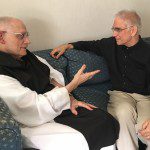 What is the relationship between prayer and joy? If we enjoy our prayer, does that mean we are avoiding the hard work of spirituality (which, at least in Christian terms, is meant to make us holy, not to entertain us)?
What is the relationship between prayer and joy? If we enjoy our prayer, does that mean we are avoiding the hard work of spirituality (which, at least in Christian terms, is meant to make us holy, not to entertain us)?
I had an interesting little exchange on Facebook the other day, when a reader, who is a priest of the Church of England, took exception to the headline of my post from last year, called Five Ways You Can Enjoy a Deeper Personal Prayer Life.
Reacting simply to that post’s headline, he wrote:
I haven’t read this article, because the title put me off! It smacks of the Protestant Individualist and Consumerist approach to faith, as in so many contemporary traditions, and it turns me off, I’m afraid. 🙁
I wrote a rather lengthy reply in which I suggest that the article certainly is not “individualist” or “consumerist” and if the headline seems to suggest that it is, well, isn’t that better than a headline that would come across as judgmental or self-righteousness?
To which he had this to say:
It’s also I guess a cultural thing about the language in which we couch things. Because from across the Pond it was very off-putting to this Anglican. But I’m not looking for a judgemental article or headline; just one which focuses first on the worship of God rather than the individual’s (consumerist) enjoyment.
At that point I let the thread go (my wife and I were on vacation at the time). But I’ve been thinking about this exchange for the past few days, and am fascinated by the commenter’s equating enjoyment with consumerism.
We live in a culture geared toward entertainment and consumption (if you doubt this, just look at the front page of Yahoo — it’s filled with stories about actors, musicians, professional athletes, reality-TV personalities, and others who make their living primarily by entertaining others). I suspect that my Anglican friend and I share a similar concern that the culture (cult?) of entertainment and consumption has negatively affected how many of us, perhaps most of us, engage with the teachings and practices of Christianity.
In other words, because we are so used to living in a society which focusses on entertaining us and selling us consumer goods, we (perhaps subconsciously) approach religion with a cultural bias: we want to be entertained. In other words, we want and expect God to amuse us.
This is one of the reasons why I have become increasingly uncomfortable with the notion of “experience” as an element of spirituality. When we talk about a “mystical experience,” are we talking about something that transfigures us (in Christian terms, it makes us more humble and holy), or are we talking about something that merely makes us feel good? If experience changes us — makes us more deeply repentant, more humble, more compassionate and loving, more merciful and forgiving, more profoundly worshipful and awe-struck by God’s glory and splendor — then it’s an experience worth having. But if it merely makes us feel pleasure, or a sense of special-ness or some other self-focused emotion, then I worry that such an “experience” may actually be a problem, not a blessing.
I haven’t yet asked my Anglican friend on Facebook, but I suspect his discomfort with my use of the word “enjoy” is related to my discomfort with the word “experience.” It reminded him of “consumer spirituality” which is a distraction from the more demanding (and God-centered) character of authentic Christian spirituality.
Fair enough.
But this begs another question, which is really the purpose of this blog post: Is it okay to enjoy prayer?
Here’s the crux of the question: if we pray only to feel God, that’s a mistake (at least in terms of Christian spirituality). But if we pray to worship God, isn’t there a place for joy in that approach to prayer?
I believe so. And I base it on the simple fact that joy is the second of the fruit of the spirit (Galatians 5:22); right behind love and just before peace. Joy is an essential element of Christian spirituality. St. Paul instructs us to rejoice in God always (Philippians 4:4; I Thessalonians 5:16). Therefore, if our spiritual practice is not fostering joy, perhaps something is out of joint.
The key to joy — holy joy, not consumerist joy — lies in our intent. If we pray to find joy, we are indulging in a kind of entertainment-spirituality. But if we pray to find God, we may expect joy to come as a gift from God. “Seek first the kingdom [of God] and God’s righteousness and all these things will be given you besides.”
True joy is like happiness or fun or even love. Such blessings rarely come to us directly. Rather, they emerge through caring for others, living in the present, and practicing virtues like generosity or kindness. Likewise, we enjoy prayer not as an end to itself, but as a by-product of the heart of prayer: growing ever-more deeply responsive to the love of God.
So yes, it’s okay to enjoy a deep prayer life! It’s okay to want joy in our lives. But the best way to do that is to seek not joy, but God. And of course, sometimes the joy will come in the midst of challenges, or suffering, or the hard work of slowly allowing God to heal us of our sin and narcissism. That’s not always fun! But I believe it’s never without joy — because God is a God of joy. And that’s something worth enjoying.
Enjoy reading this blog?
Click here to become a patron.
Stay in touch! Connect with Carl McColman on Facebook:














